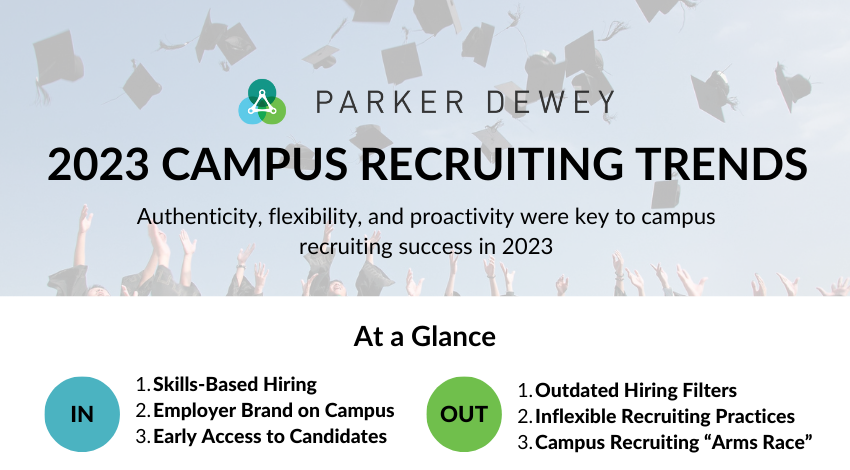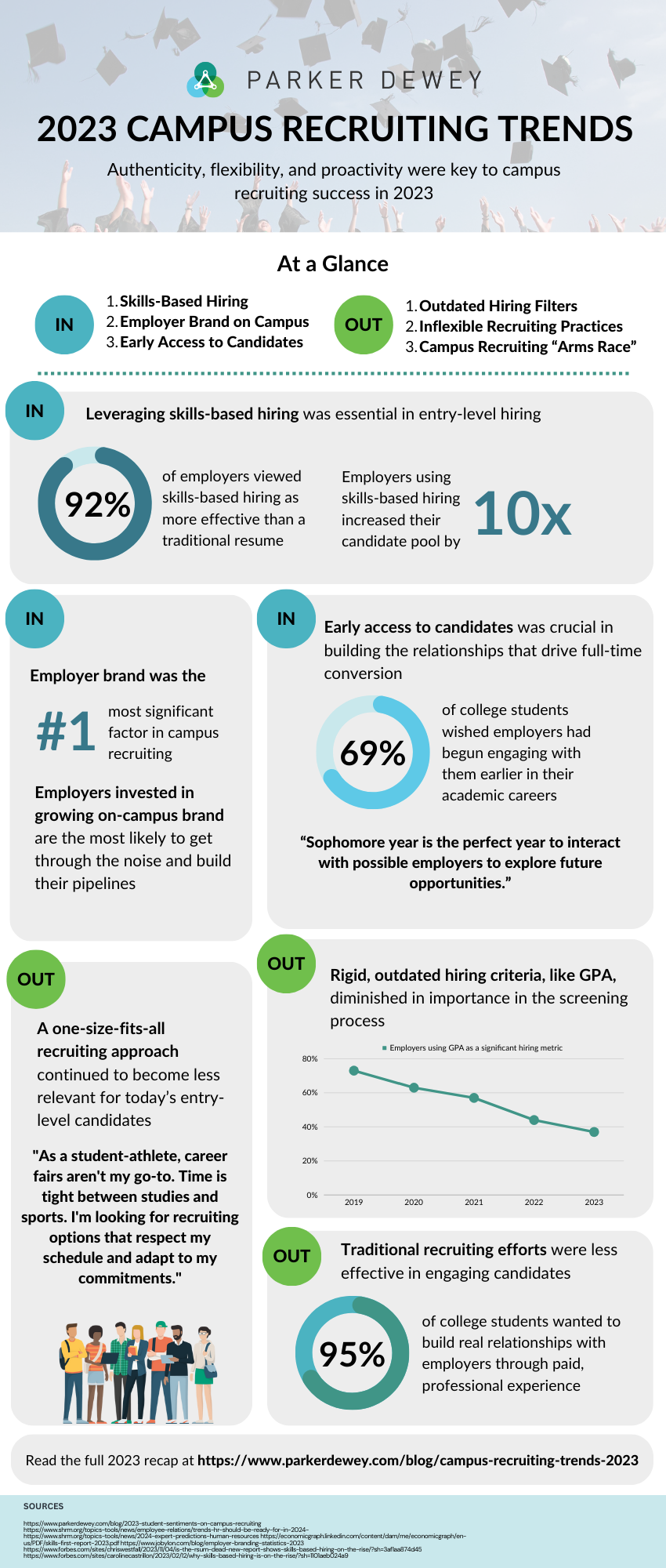
2023 Campus Recruiting Trends
With 2023 in the rearview, the Parker Dewey team rounded up lessons learned from last year’s campus recruiting landscape—from redefining traditional hiring criteria, to navigating on-campus events, to embracing out-of-the-box recruiting practices. If we’ve learned anything from the last few unusual years of campus recruiting, “talent remains the defining asset that drives a company’s business and the primary profit lever that differentiates superstar organizations from those that struggle to remain competitive.” And in order to attract talent, employers need to ensure their recruiting practices align to current trends—while moving away from out-of-date practices.
Trends on the Rise in 2023
- Leveraging in Skills-Based Hiring: The use of “skills-based hiring” has become essential, especially as employers continue shifting their focus from traditional metrics like GPA to a more holistic evaluation of candidates. The emphasis highlights the importance of identifying and nurturing essential skills, recognizing that a well-rounded skill set often outweighs academic pedigree. According to 2023 LinkedIn research, employers that leverage skills-based hiring are 60% more likely to make a successful entry-level hire, while also creating a better candidate (and employee) experience. Furthermore, the use of skills-based hiring versus the artificial barriers that exist increase the candidate pool by more than 10x, helping employers address those hard-to-fill roles.
- Expanding Employer Brand on Campus: NACE research shows that employer brand is the most significant factor in campus recruiting. To attract top talent, it’s critical to go beyond career fairs, info sessions, and inundating student inboxes with emails in order to make authentic relationships. As we’ve seen at Parker Dewey, companies invested in making real, meaningful connections with talent are the ones most likely to get through the noise, build their pipelines, and establish a strong employer brand on campus.
- Early Access to Prospective Candidates: Employers have recognized the importance of connecting with candidates earlier in their college careers. This does not mean making offers a year (or more!) in advance, but rather engaging first and second year students to introduce their company culture, potential roles. This provides the opportunity to build and nurture the relationships that ultimately drive full-time hire conversion. In addition, these first two years are vital since most students have already decided on a specific industry, role, or even company by their Junior year, causing employers to miss out on potential great candidates. This also aligns to the preferences of students, with 69% of college students sharing that they wished employers had begun engaging with them earlier in their academic careers. As one community college student put it, “Sophomore year is the perfect year to interact with possible employers to explore future opportunities.”
Trends on the Decline in 2023
- GPA and Academic Credentials as a Filter: The rigid reliance on GPA and academic credentials as primary hiring criteria diminished in 2023. Companies recognized the limitations of these metrics in predicting real-world success, and shifted towards a more inclusive and effective approach that values diverse experiences and skills over traditional academic measures. NACE reported that 37% of employers were still weighing GPA as an important screening factor, down from 73.3% in 2019. While some hiring managers still look at GPA, this too has changed dramatically.
- Inflexible Recruiting Approaches: As the demographic of college students changes, the one-size-fits-all approach to both recruiting and the on-the-job experience has become less effective. Many potential candidates were unable to participate in the traditional recruiting activities because of class, athletics, work, or other commitments, leading organizations to seek other tools to engage and assess candidates. Furthermore, organizations are finding that an exclusive focus on remote or on-site doesn’t work. Students and recent grads are hungry for authentic, in-person engagement, but want to know the organization embraces a modern approach to work.
- Campus Recruiting “Arms Race”: In 2023, candidates sought more authentic experiences. It’s no longer enough for employers to throw swag at students and expect to connect with top-tier candidates. NACE reported that while 45% of the class of 2023 attended an in-person career fair and 13.1% attended a virtual one, only 40% of participants found them useful in making their decisions. This was evidenced by comments ranging from “It was nothing more than I could find on their website” to “Do they really think fancier swag or events will make me want to join?“ In contrast, over 95% of students said they want opportunities to actually experience the organization through opportunities like a Micro-Internship. This is not surprising as year after year, students report that they want to build authentic relationships with potential employers, signaling a shift towards a more human-centric recruitment approach.
By embracing flexibility, authenticity, and an inclusive mindset, organizations can stay ahead in the race for top talent. As we step into 2024, the lessons learned from the past year will undoubtedly shape the narrative of early-career recruiting, ensuring that talent remains not only the driving force in the success of organizations in an ever-evolving recruiting landscape.
Parker Dewey’s 2023
During the past year, thousands of college students, recent graduates, and career changers were able to leverage the Parker Dewey platform to build their experience, confidence, and network to effectively launch their careers.
For employers, the biggest trend has been more early career programs integrating Micro-Internships into their campus recruiting strategies. Having seen the success from the one-off projects, companies have been more intentional in using this skills-based hiring approach at scale. In particular, companies have been using Micro-Internships to:
- Engage and assess first and second year students as a “feeder” into other recruiting activities. This allowed them to reach individuals not considering their organization and “test drive” candidates for fit earlier in the process.
- Connect with students from institutions beyond focus schools. In one example, this leading Fortune 500 company expanded its approach from four target schools, ultimately reaching students from 800+ institutions through its Micro-Internship program.
- Build an employer brand on college campuses. Whether students hold preconceived notions about a company or just aren’t familiar, Micro-Internships solve the lack of student awareness challenge. Leading CRM platform HubSpot is one example of a company that leverages Micro-Internships, partnering with HBCUs to engage students on actual projects that complement their coursework and classroom experience. This approach allows hiring managers to interact with students directly, fostering awareness and piquing their curiosity about lesser-known organizations.
- Empower employee resource groups (ERGs) to become strategic recruiting partners for the organization. By leveraging Micro-Internships, ERG members actively engaged with diverse candidates and provided career mentoring support while getting assistance on real work projects.
- Maximize recruiting impact with minimal resources. With Micro-Internships, employers invest only a fraction of the time and money demanded by typical recruiting methods. Companies on the Parker Dewey platform typically saw 40-80% in cost savings on cost-per-hire when incorporating Micro-Internships into their existing processes.
In all these instances, large numbers of students completed these small projects, quickly providing valuable insights beyond traditional assessments. The ease of implementation was driven by hiring managers recognizing the value Micro-Internships brought to the recruitment process.
On a broad scale, Micro-Internship programs continued to serve as valuable tools for implementing a skills-based hiring strategy, enhancing employer brand on college campuses across the country, and connecting with students in their earlier years of school.
A quick recap of some of our top stories:
How Xylem Expanded Brand Awareness and Improved Early-Career DEI
Xylem, a leading global water technology company, successfully engaged early-career talent and increased diversity through a strategic partnership with Parker Dewey. The initial Micro-Internship pilot program, featuring 15 projects, attracted over 480 college students from nearly 300 schools, showcasing a cost-effective and skills-based hiring approach that significantly diversified Xylem's talent pipeline. Xylem’s program is still ongoing; as of last quarter, the initiative has facilitated connections with more than 3,000 candidates from 800+ schools.
Trane Technologies, a global climate innovator, successfully leveraged Micro-Internships to access, assess, engage, and hire early-career talent while benefiting from immediate project support. This approach not only built brand awareness but also provided valuable experiences for both the organization and the Micro-Interns.
How One Nonprofit Founder's Short-Term Micro-Intern Became a Long-Term Hire
The University of Delaware's BlueHensWork Micro-Internship Program connects students with impactful projects at nonprofits and government agencies. Follow the journey of Sarah Lutot, a student who turned her Micro-Internship at Reel Families for Change into a long-term role, highlighting the success of the program in creating mutual fits between students and organizations.
Sources:
https://www.parkerdewey.com/blog/2023-student-sentiments-on-campus-recruiting
https://www.shrm.org/topics-tools/news/employee-relations/trends-hr-should-be-ready-for-in-2024-
https://www.shrm.org/topics-tools/news/2024-expert-predictions-human-resources
https://www.jobylon.com/blog/employer-branding-statistics-2023



.png)

.png)